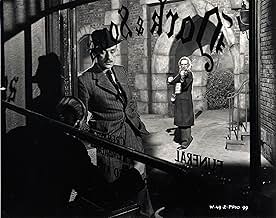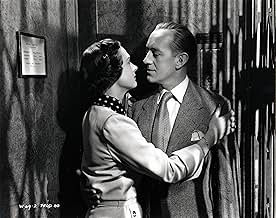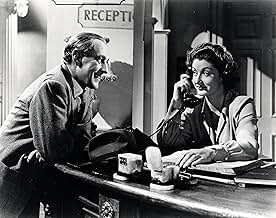IMDb RATING
7.3/10
2.3K
YOUR RATING
When a lonely, unappreciated farm-equipment salesman discovers he has only a few weeks to live, he withdraws his savings for a final holiday at a "posh" resort.When a lonely, unappreciated farm-equipment salesman discovers he has only a few weeks to live, he withdraws his savings for a final holiday at a "posh" resort.When a lonely, unappreciated farm-equipment salesman discovers he has only a few weeks to live, he withdraws his savings for a final holiday at a "posh" resort.
Grégoire Aslan
- Gambini
- (as Coco Aslan)
Eveline Kirkwood-Hackett
- Miss Hatfield
- (as Mme. Kirkwood-Hackett)
- Director
- Writers
- All cast & crew
- Production, box office & more at IMDbPro
Featured reviews
A small-town salesman, George Bird, learns that he is suffering from an incurable condition, leaving him only weeks to live. With no family or friends to care for, he decides to spend his modest savings on his first and last stay in a grand hotel.
The other guests soon notice that he is new to hotel life, and react to him in different ways - some disdainful, some intrigued and friendly. These guests reflect the old English class-system, with its myriad of sub-classes, starting to die out by 1950, largely because of the left-wing postwar government that had been so championed by J.B. Priestley, author of this screenplay.
Before long, Bird's life seems to be opening out, with job-offers, investment opportunities, even a chance of love. A bitter irony of course, as these opportunities will never be enjoyed (or so we are to assume).
The comfortable hotel life gets a jolt when the staff are suddenly called-out on strike, instantly shaking-up the class-system, as all the guests have now got to try to pitch-in and help, as best they can. This provides for a number of accidental meetings that move the plot forward dramatically. And the effect on Bird's humdrum life, suddenly turned roller-coaster, is dramatic indeed.
Interesting to see the yet-undiscovered Sid James as a dodgy gambler, and David McCallum's father (also David) on the violin, beginning and ending the story with a simple but curiously haunting theme.
For a film that has given so much pleasure - check the other IMDb reviews - it may seem spoilsport to suggest that Alec Guinness does not quite carry conviction as such a small and narrow character as Bird. This is someone who just earns his daily pittance and then goes home to read the paper and smoke his pipe. For this role, Guinness simply looks and sounds too cultivated, too sociable, altogether too biddable. (Ironically there was a character actor called Norman Bird, who would have been perfect!)
The other guests soon notice that he is new to hotel life, and react to him in different ways - some disdainful, some intrigued and friendly. These guests reflect the old English class-system, with its myriad of sub-classes, starting to die out by 1950, largely because of the left-wing postwar government that had been so championed by J.B. Priestley, author of this screenplay.
Before long, Bird's life seems to be opening out, with job-offers, investment opportunities, even a chance of love. A bitter irony of course, as these opportunities will never be enjoyed (or so we are to assume).
The comfortable hotel life gets a jolt when the staff are suddenly called-out on strike, instantly shaking-up the class-system, as all the guests have now got to try to pitch-in and help, as best they can. This provides for a number of accidental meetings that move the plot forward dramatically. And the effect on Bird's humdrum life, suddenly turned roller-coaster, is dramatic indeed.
Interesting to see the yet-undiscovered Sid James as a dodgy gambler, and David McCallum's father (also David) on the violin, beginning and ending the story with a simple but curiously haunting theme.
For a film that has given so much pleasure - check the other IMDb reviews - it may seem spoilsport to suggest that Alec Guinness does not quite carry conviction as such a small and narrow character as Bird. This is someone who just earns his daily pittance and then goes home to read the paper and smoke his pipe. For this role, Guinness simply looks and sounds too cultivated, too sociable, altogether too biddable. (Ironically there was a character actor called Norman Bird, who would have been perfect!)
Although most Americans have little knowledge of his work other than Star Wars, Alec Guinness produced an amazing body of work--particularly in the 1940s-1950s--ranging from dramas to quirky comedies. I particularly love his comedies, as they are so well-done and seem so natural and real on the screen--far different from the usual fare from Hollywood.
This movie is the story of a man who thinks he is dying and decides to go out in style--living it up among the wealthy and well-bred. After all, he figures, he certainly won't need the money after he's gone! The marvelous acting and experiences among the upper crust make this a must-see. However, be forewarned, this is an incredibly depressing film. I doubt if I would have allowed the movie to be as dark as this one, but at least I can commend those who made it for not taking the easy way out and making a typical Hollywood style ending.
This movie is the story of a man who thinks he is dying and decides to go out in style--living it up among the wealthy and well-bred. After all, he figures, he certainly won't need the money after he's gone! The marvelous acting and experiences among the upper crust make this a must-see. However, be forewarned, this is an incredibly depressing film. I doubt if I would have allowed the movie to be as dark as this one, but at least I can commend those who made it for not taking the easy way out and making a typical Hollywood style ending.
Alec Guinness stars in "Last Holiday," a 1950 British film which was remade years later with Queen Latifah as the star. Though I enjoyed the warmth of the later version, the Guinness "Last Holiday," no surprise, is superior.
Guinness plays a lower class Brit, George Bird, who is told he is going to die of a rare disease and has maybe a few months left to live. George quits his job, takes his savings, and goes to stay at a ritzy resort. There, he changes, and circumstances change for him. With nothing to loses any longer, he becomes outspoken. He also wins at poker, croquet, and a horse race. He's offered jobs. And there's the possibility of romance.
This is supposedly a comedy, but it's not an uproarious one. It's more drama, in fact. George Byrd finds that all these wealthy people aren't all they're cracked up to be. He also finds out that when you let go and stop trying, opportunities appear. And he learns the difference between passing the time and doing something with your time.
Alec Guinness is brilliant as George, timid at first, gaining stature with his new clothes, and asserting himself once he gets to the resort. It's a beautifully layered performance.
Despite some sadness within the film, this is an excellent story of a man who learns life's lessons in a narrow space of time.
Guinness plays a lower class Brit, George Bird, who is told he is going to die of a rare disease and has maybe a few months left to live. George quits his job, takes his savings, and goes to stay at a ritzy resort. There, he changes, and circumstances change for him. With nothing to loses any longer, he becomes outspoken. He also wins at poker, croquet, and a horse race. He's offered jobs. And there's the possibility of romance.
This is supposedly a comedy, but it's not an uproarious one. It's more drama, in fact. George Byrd finds that all these wealthy people aren't all they're cracked up to be. He also finds out that when you let go and stop trying, opportunities appear. And he learns the difference between passing the time and doing something with your time.
Alec Guinness is brilliant as George, timid at first, gaining stature with his new clothes, and asserting himself once he gets to the resort. It's a beautifully layered performance.
Despite some sadness within the film, this is an excellent story of a man who learns life's lessons in a narrow space of time.
I love this film and it's one of the few I've watched time and time again. It's a forgotten jewel and is infrequently mentioned. For me it has everything that was important of it's era. The social comment is mingled into an entertaining story. How the Health Service is expanding but people go hungry. An over worked Doctor making mistakes. George Bird being projected into a world that is not his own. The irony of riches coming his way when he thinks he has little time left. The Union's getting their grip on the country with strike action. How the upper classes view the lower and vice versa. How George Bird is now viewed as upper class because of his new setting. Post war money laundering. How war heroes can't find work. Love and jealousy. And the ironies - how he buys a dead man's clothes. How he swerves a car to avoid a dog that is due to be destroyed and turns into a road called 'Fallow End.' Then there is the acting. Sid James gives one of his great performance. His 1940's and 1950's work was superb. Sadly remembered for his Carry On performances more than the superb actor that he was. He just holds the scenes and in some cases is competing well with Guinness. For Guinness this is an early film. Ernest Thiesiger makes a great appearance along with many others including the delightful Kay Walsh. Esma Cannon's acting is well done - better than her later performances where 'silly' scripts let her down.
Please do see it if you can. It's a little gem.
Please do see it if you can. It's a little gem.
Last Holiday contains the first really dramatic performance by Alec Guinness. It's also the first time he's carrying a film as per the billing on the strength of his abilities. It's one beautiful performance in a picture with a universal message.
Alec Guinness plays your British every man who having no wife, no family, and no close relatives is likely to be remembered by very few when he passes on and then for a short time. He's given the news that the grim reaper is close, it might be a matter of a few weeks or a few months. What to do but go out and just enjoy things while you can.
So he packs off and stays at the small but posh Regal Hotel, a seaside resort much prized by the British vacationers. And he has some phenomenal luck there, winning huge poker pots, longshot horse racing bets coming in. He even finds some love with hotel housekeeping manager Kay Walsh. But how to tell the new friends he's made what is in store for him?
J.B. Priestley wrote the original script and in my opinion should have been a candidate for all kinds of awards. It is direct and simple and never maudlin. Guinness got the character down perfectly. And the ending is truly ironical.
Which must have pleased and singed director Henry Cass a bit. Back in the 30s when Guinness was starting in the profession he tried out for a stage production directed by Cass who told him in no uncertain terms he was a no talent bum. This comes from a biography of Guinness. Kind of like Phil Rizzuto who was told he'd never be a ballplayer by Casey Stengel and then having him as his manager on the Yankees after becoming an All Star.
One should watch Last Holiday together with Grand Hotel and note some of the similarities and the differences with Lionel Barrymore and Alec Guinness both portraying men under a death sentence.
I think the message is the same, you never know when you're checking out so live accordingly.
Alec Guinness plays your British every man who having no wife, no family, and no close relatives is likely to be remembered by very few when he passes on and then for a short time. He's given the news that the grim reaper is close, it might be a matter of a few weeks or a few months. What to do but go out and just enjoy things while you can.
So he packs off and stays at the small but posh Regal Hotel, a seaside resort much prized by the British vacationers. And he has some phenomenal luck there, winning huge poker pots, longshot horse racing bets coming in. He even finds some love with hotel housekeeping manager Kay Walsh. But how to tell the new friends he's made what is in store for him?
J.B. Priestley wrote the original script and in my opinion should have been a candidate for all kinds of awards. It is direct and simple and never maudlin. Guinness got the character down perfectly. And the ending is truly ironical.
Which must have pleased and singed director Henry Cass a bit. Back in the 30s when Guinness was starting in the profession he tried out for a stage production directed by Cass who told him in no uncertain terms he was a no talent bum. This comes from a biography of Guinness. Kind of like Phil Rizzuto who was told he'd never be a ballplayer by Casey Stengel and then having him as his manager on the Yankees after becoming an All Star.
One should watch Last Holiday together with Grand Hotel and note some of the similarities and the differences with Lionel Barrymore and Alec Guinness both portraying men under a death sentence.
I think the message is the same, you never know when you're checking out so live accordingly.
Did you know
- TriviaThe film includes cast members who cropped up in various Alec Guinness films. Amongst them are Sidney James, Ernest Thesiger and Kay Walsh.
- GoofsBird states that he made about 9 Pounds a week. This is about 470 Pounds per annum. When his manager is trying to get him to stay he first offers to raise his salary to 400 Pounds p.a.
- Quotes
George Bird: How do you keep smiling with a stiff upper lip?
- ConnectionsRemade as Vacances sur ordonnance (2006)
- How long is Last Holiday?Powered by Alexa
Details
- Release date
- Country of origin
- Language
- Also known as
- Last Holiday
- Filming locations
- Luton, Bedfordshire, England, UK(Shopping parade and Doctor's office)
- Production company
- See more company credits at IMDbPro
- Runtime
- 1h 28m(88 min)
- Color
- Aspect ratio
- 1.33 : 1
Contribute to this page
Suggest an edit or add missing content



















